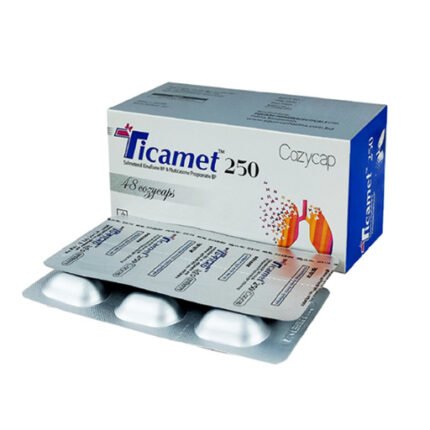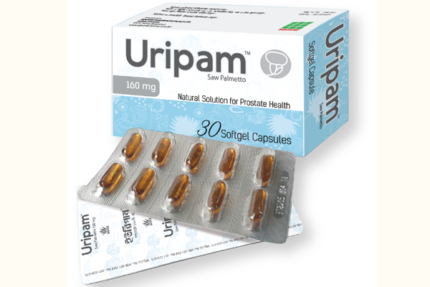Ticamet 100 Cozycap
39.12৳ Strip
Ticamet Inhaler offers effective asthma management through a combination of Salmeterol Xinafoate and Fluticasone Propionate. Suitable for patients not adequately controlled with inhaled corticosteroids alone, it improves lung function and prevents exacerbations. Available in inhaler or capsule form, dosage varies by age and condition severity. With proper administration and considerations for interactions, pregnancy, and lactation, Ticamet ensures safe and convenient asthma control.
 Brand
Brand
|
Square Pharmaceuticals PLC |
|---|---|
 Generics
Generics
|
Salmeterol + Fluticasone Propionate |
Indications
Ticamet Inhaler is a prescribed medication used for the regular management of asthma. It is specifically recommended when a combination product consisting of a long-acting β2-agonist and an inhaled corticosteroid is deemed suitable for the patient’s condition. This inhaler is typically recommended for two types of patients: those who are not adequately controlled with inhaled corticosteroids alone, and those who require both inhaled corticosteroid and long-acting β2-agonist for effective asthma control.
Pharmacology
Ticamet combines two active ingredients: Salmeterol Xinafoate and Fluticasone Propionate. Salmeterol Xinafoate is a selective, long-acting beta-2 agonist that is primarily used in the treatment of asthma and other forms of airway obstruction. It works by protecting against asthma symptoms. On the other hand, Fluticasone Propionate is a corticosteroid with predominantly glucocorticoid activity. It exerts a topical effect on the lungs without causing systemic effects at usual doses. Fluticasone Propionate works to improve lung function and prevent exacerbations of asthma. This combination of medications offers a more convenient treatment option for patients who require both a β2-agonist and an inhaled corticosteroid.
Dosage
For adults and adolescents aged 12 years and older, the recommended dosage of Ticamet Inhaler involves taking 2 puffs containing 25 µg of Salmeterol and either 50 µg, 125 µg, or 250 µg of Fluticasone Propionate, twice daily, depending on the severity of the condition. For children aged 4 to 12 years, the recommended dosage is 2 puffs of 25 µg Salmeterol and 50 µg Fluticasone Propionate twice daily.
Administration
Proper administration of the Ticamet Inhaler is crucial for effective asthma management. Correct usage ensures optimal delivery of medication to the lungs, reducing the risk of asthma attacks. Patients should be instructed on the correct technique, including steps such as shaking the inhaler before each use, proper inhalation technique, and rinsing the mouth after each use.
Interaction
Patients should exercise caution when using Ticamet Inhaler with certain medications to avoid potential interactions. Specific instructions are provided to ensure safe co-administration with other drugs.
Contraindications
Ticamet Inhaler is contraindicated in patients with a history of hypersensitivity to its components. Additionally, it should not be used as the primary treatment for acute asthma episodes.
Side Effects
The expected side effects and adverse reactions associated with Ticamet’s components are outlined, along with recommendations for management. These may include pharmacological side effects like tremor, palpitations, headache, and potential adverse events such as hoarseness and candidiasis.
Pregnancy & Lactation
The use of Ticamet Inhaler during pregnancy and lactation should be carefully considered, weighing the benefits against potential risks to the fetus or child.
Precautions & Warnings
Specific precautions and warnings are provided for patients with asthma, COPD, and other conditions, ensuring safe usage of Ticamet Inhaler.
Storage Conditions
Proper storage instructions are provided to maintain the efficacy and safety of Ticamet Inhaler, including avoiding puncturing, breaking, or incinerating the pressurized canister and storing it below 30°C.













Reviews
There are no reviews yet.